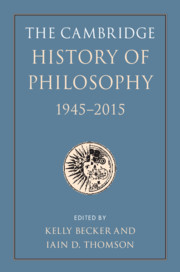Book contents
- The Cambridge History of Philosophy, 1945–2015
- The Cambridge History of Philosophy, 1945–2015
- Copyright page
- Contents
- Contributors
- Preface and Acknowledgments
- Introduction
- Part I Analytic Philosophy
- Part II Continental Philosophy
- Part III Bridge Builders, Border Crossers, Synthesizers, and Comparative Philosophy
- Section Eight Bridge Builders, Border Crossers, Synthesizers
- Section Nine Comparative Philosophy
- 49 Authenticity and the Right to Philosophy
- 50 The East in the West
- 51 Jewish Philosophy and the Shoah
- Part IV Epilogue: On the Philosophy of the History of Philosophy
- References
- Index
49 - Authenticity and the Right to Philosophy
On Latin American Philosophy’s Great Debate
from Section Nine - Comparative Philosophy
Published online by Cambridge University Press: 08 November 2019
- The Cambridge History of Philosophy, 1945–2015
- The Cambridge History of Philosophy, 1945–2015
- Copyright page
- Contents
- Contributors
- Preface and Acknowledgments
- Introduction
- Part I Analytic Philosophy
- Part II Continental Philosophy
- Part III Bridge Builders, Border Crossers, Synthesizers, and Comparative Philosophy
- Section Eight Bridge Builders, Border Crossers, Synthesizers
- Section Nine Comparative Philosophy
- 49 Authenticity and the Right to Philosophy
- 50 The East in the West
- 51 Jewish Philosophy and the Shoah
- Part IV Epilogue: On the Philosophy of the History of Philosophy
- References
- Index
Summary
The brutal subjugation of America’s Indigenous cultures required an equally brutal erasure of indigenous epistemologies and their corresponding cosmologies. Because the success of the colonial project depended on the spiritual conquest of native peoples, however, what was erased was immediately replaced with something else. This replacement, although similar in structure, was radically different in content, namely: Western religion (Catholicism) and philosophy (Scholasticism), the latter conceived as an advanced method of dialectical reasoning and rigorous conceptual analysis, representing civilized rationality. As a result, philosophy replaced indigenous oral metaphysical traditions with a written tradition that privileged disembodied rationality and linear thinking over other kinds of knowing that could be described as embodied, holistic, and non-linear.1 Philosophy is thus a modern intervention into Latin American history, a fact that makes it difficult, and some would say anachronistic, to speak of an Aztec or Nahual philosophy.2 This philosophy’s role in the spiritual colonization and subjugation of Indigenous peoples, moreover, makes it problematic to speak here of an authentic and autonomous Latin American philosophy.
- Type
- Chapter
- Information
- The Cambridge History of Philosophy, 1945–2015 , pp. 679 - 691Publisher: Cambridge University PressPrint publication year: 2019
- 1
- Cited by



